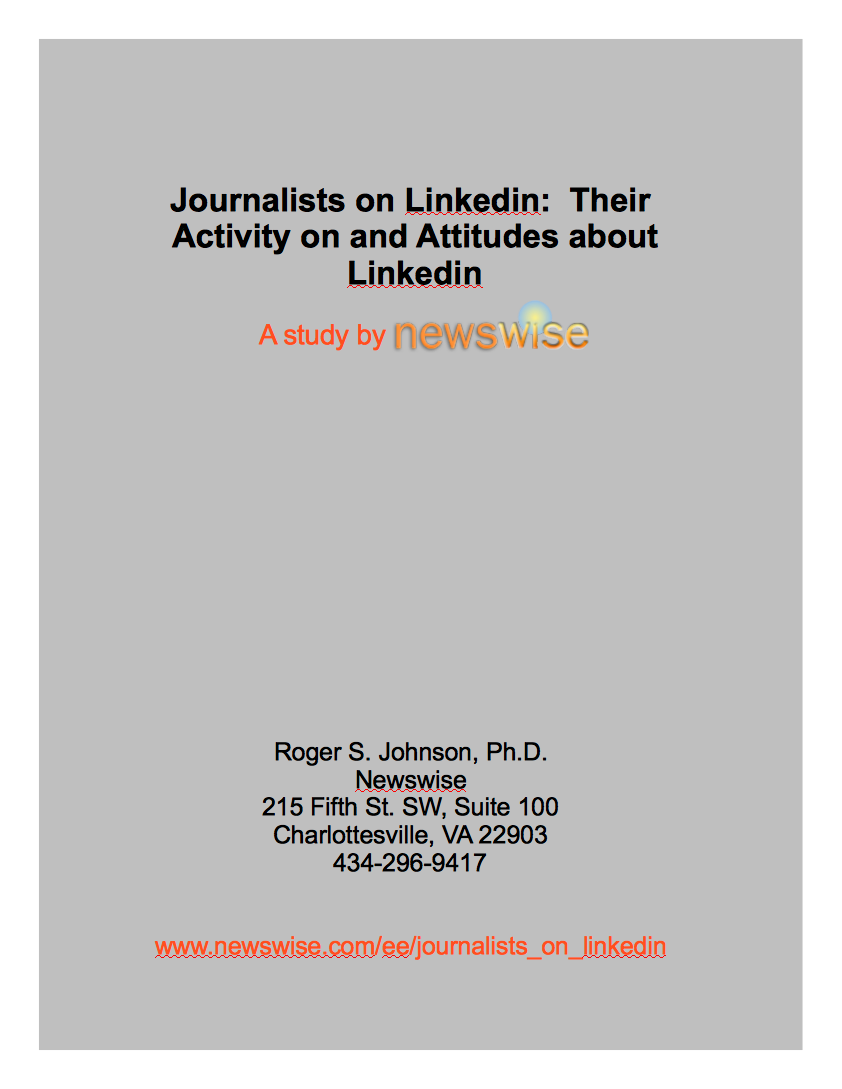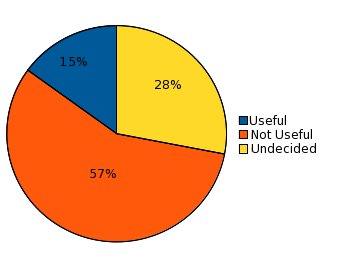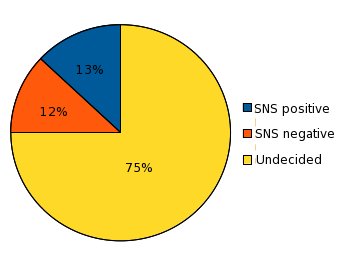
Contents
Introduction
Background
Study Design
Survey and Search Results
Conclusions
Appendix A: Survey Message
Appendix B: Attitudes toward Linkedin
Appendix C: Attitudes toward Social Media
Appendix D: About Newswise
In a recent study, Newswise found that 70 percent of reporters surveyed had profiles on Linkedin. The more important finding of this study is that most are not actively participating on Linkedin or other social networks, because they have not yet discovered any value from being there.
The impact of social media on journalism has been profound and is ongoing. Social media is a large and complex concept, and understanding its impact on journalists requires segmentation. In this study Newswise, assesses one domain, the social networking site Linkedin, and specifically journalists’ activity on and attitudes about Linkedin. This study aims to help media relations professionals understand the value of social media, specifically Linkedin, and develop a social media strategy for relating to journalists.
Reporters represent a special public sector. You might expect them to be curious about a cultural phenomenon such as social networking; and, while they might not embrace it, they would explore.
The culture as a whole has embraced social media, especially social networking. Facebook and Linkedin are the leading social networks, and a simple way of distinguishing them is that Facebook is more appropriate for personal networking, and Linkedin is designed for professional networking.
A recent Pew document: Social networking sites and our lives (Jun 16, 2011) reports on the widespread social response to social networking and explored the question of whether participating in online communities negatively impacts relationships. The study found that Facebook users are more trusting, have more close relationships, receive more social support, are more politically engaged, and revive dormant relationships more than nonusers. The study reported that 79% of adult Americans used the Internet, and 59% of Internet users use at least one of SNS.
“Questions have been raised about the social impact of widespread use of social networking sites (SNS) like Facebook, Linkedin, MySpace, and Twitter. Do these technologies isolate people and truncate their relationships? Or are there benefits associated with being connected to others in this way? The Pew Research Center’s Internet & American Life Project decided to examine SNS in a survey that explored people’s overall social networks and how use of these technologies is related to trust, tolerance, social support, and community and political engagement.
“The findings suggests that there is little validity to concerns that people who use SNS experience smaller social networks, less closeness, or are exposed to less diversity.”
Prominent journalist blogger and social media advocate Amy Gahran writes about tthe lessons for journalists in the Pew study: “…in recent years, journalists and news organizations often have been among the loudest, most strident voices warning of the growth of a dangerous echo chamber that would undermine society and democracy. Much of this is no doubt motivated by genuine concern—but at least part of this is also certainly a backlash against their declining power as gatekeepers. People rarely surrender power without a fight or protest.” Social media is not the enemy she argues and “it’s probably more important than ever for journalists and news organizations to embrace engagement through social media.”
This Pew study provides a context for the Newswise study. Journalists are exploring social networking sites, and understanding their attitudes and participation in this new technology may help the profession move forward.
The 2011 Arketi Web Watch Media Survey released in July 2011 reported that 92% of business journalists have a Linkedin profile. “Sixty-four percent of journalists say they spend more than 20 hours a week online, with 21% spending more than 40 hours a week using the Internet. Virtually all (98%) journalists read news online, and 91% search for news sources and story ideas.”
The April 2011 study from ROI Research and Performics found that the highest percentage of online consumers think having a Linkedin account is more important than any other social network. S-Net: A Study in Social Media Usage and Behavior found that 59% of online consumers rate having a Linkedin account 4 or 5 on a scale of one to five of importance, compared to 53% giving this level of importance to having a Facebook account. The study examined the behavior of 2,997 consumers who regularly use social networks to discuss such products as apparel, appliances, electronics, entertainment and travel.
In this first part of a multi-phase study, Newswise surveyed 1000 journalists about their activity on and attitudes toward LinkedIn. These 1000 journalists are Newswise users (they subscribe to the Newswise Daily Wire), and the survey was interactive and conversational rather than a simple checklist of choices. Newswise engaged the responders in a dialogue to gauge attitudes. Sometimes several messages were exchanged to gather further and more elaborate attitudinal information. See the email message in Appendix A.
In the second part of the study, Newswise directly searched for these 1000 journalists on LinkedIn.
The purpose of this study was primarily to assess the value of creating a Linkedin Group for journalists. As part of that assessment, Newswise measured the frequency of journalist participation in and their attitudes about that network, attitudes about participating in communities, especially online/virtual journalism communities.
Newswise searched for the 1000 reporters and found 701 (70%) on Linkedin. Newswise could not definitively identify 299 (30%) of those searched by name. (Some of those not found might be on Linkedin but could not be distinguished by name. However, 70%, at least, have profiles on Linkedin.
A positive outcome and a different level of response was that 309 (42%) of the journalists with Linkedin profiles connected personally via Linkedin to the Newswise surveyer. Connecting is one of the major functions of Linkedin and allows users to share more information more easily and reflects an enhanced professional relationship built on trust.
What were the characteristics of the survey journalists? Ninety-five percent (949) of the surveyed journalists were located in the USA. Of the 51 International journalists surveyed, 39 (76%) had Linkedin profiles. All of the surveyed journalists subscribe to the Newswise Daily Wire, so this might represent a group more adept than the average journalist at online behavior and more eager to participate with new technology. While it is a fairly diverse group of journalists, and no attempt has been made to represent them as a typical journalist profile, many of them are also science and medical reporters, so they might be less technophobic than the general journalist population. They are mostly (74%) staff reporters, while 24% were freelance. Seventy percent of the surveyed journalists were reporters and 30% were editors.
Of the 1000 surveyed journalists, 170 (17%) replied and answered questions. Of these responders, 7 (4%) responders were international journalists.
One-hundred-twenty-eight (75%) of the 170 responders were Linkedin members. This group is subsequently referred to as “Linkedin responders”. Those who replied were slightly more inclined to be Linkedin members. Forty-two (25%) of the responders were not Linkedin members.
Only 19 (15%) of the Linkedin responders said they had found Linkedin useful. The majority, 73 (57%), wrote they had not yet figured out how to make Linkedin useful. Many of these indicated that they had not made much effort on Linkedin because the benefits were not clear or attractive. Sample responses reflecting the journalists’ attitudes toward Linkedin are shown in Appendix B.

Figure 1. Journalists are not avid users of Linkedin.
Only 39 of 128 Linkedin responders (30%) were able to provide a link to their own profile, for example. This indicates that the Linkedin users are not very adept or do not find Linkedin user friendly; they don’t know how to refer contacts to their own profile beyond suggesting a search for their name. These users do not know how to identify their own user profiles with a simple Internet address (url). In searching for thousands of Linkedin users by name, it is uncommon to find a unique name, and it is often difficult to identify the person you are looking for unless you have other unique, identifying information about the person. Quite often users have multiple profiles, are unaware of this, and/or don’t know how to delete unintended duplicates.

Figure 2. Few journalists report positive attitudes toward social networking in general.
The attitudes toward Linkedin fit within the overall context of attitudes toward social media. Of the 128 Linkedin responders only 16 (13%) suggested a positive response to social networking, while 15 (12%) indicated an overall negative reaction to social networking generally. On the other hand, 25 (61%) of the 41 responders who were not on Linkedin expressed negative attitudes about social media and social networking, so the Linkedin group, who had actually explored, participated in Linkedin were significantly more open to networking online. Sample responses reflecting the journalists’ attitudes toward social media in general are shown in Appendix C.
One of the major outcomes of this study was the comprehensive view of reporters’ attitudes about social media and Linkedin particularly. They are trying but have not found social media or social networking to boost their professional effectiveness.
One point that stands out is that the negative assessments by nonusers provides little value, because they are offered by people who mostly have not used and do not understand the technology; they responded from the technophobic, late applier point of view. The value it provides is to assess the community’s use of the technology and the level and kinds of resistance to the technology. But their critiques are largely uninformed.
Seventy percent of this subset of journalists have profiles on Linkedin, but they overwhelmingly reported finding no value and are not active there.
Newswise concludes that having a profile and adding connections on Linkedin does not provide an adequate threshold for effective social networking among journalists. More is needed. The second part of this multi-phase study will examine the question of what is needed.
While journalists are not enthusiastic about or loyal to Linkedin, it would be missing a major opportunity to ignore the value in finding them there. The possibility of finding them, reviewing their professional resumes, sending them messages, and inviting them to “connect” provides a unique new opportunity to enhance the relationship with the news media.
Newswise is going beyond this attempt to connect, where we have already found that journalists who use our service are generally willing to connect
The opportunity of social networking site Linkedin resembles in many ways the situation Newswise discovered 20 years ago, when we innovated this method of delivering digital, database, electronic information to journalists. At that time few journalists had email or were online. The one exception was the CompuServe Journalism Forum, and in many ways, social networking has recouped what was first expressed there.
Newswise is always exploring for state-of-the-art technology to deliver news to journalists subscribers. Delivery in the best sense is not just one-way broadcasting but is based on a feedback and participatory relationships. Linkedin provides a useful platform to find and relate to journalists. Newswise seeks to foster the best relationship with journalists by providing highly credible content and allowing journalists choice in the methods and timing of delivery and the selection of content and by relating to journalists as collaborators in a system.
This was sent to 1000 journalists who subscribe to the Newswise Daily Wire starting on 1-13-2011 and completed on 2-28-2011.
Subject header = Newswise Question
First name,
How are you doing, and happy 2011.
I’d like to ask you a specific question about an area we’re interested in pursuing. Are you on Linkedin, and if so, what is your profile url there? ________ (Mine is: http://www.linkedin.com/in/rogerjohnson1newswise)
We’re considering creating a group for journalists and providing a service there. From preliminary investigation, it looks like most of the journalists I know are on Linkedin, but most have not yet figured out how to make it effective or benefit their career. I don’t have an answer for that yet either. What do you think?
I’ve started several groups on Linkedin and Facebook, and they can be useful for specific purposes, and they can be good for connecting with people and creating community. I’m not sure journalists, in general, are much into connecting and creating community. What about you?
I think something more would be necessary, such as some kind of professional service. What do you think?
Appendix B: Attitudes toward Linkedin
“I have primarily been using Linkedin to find and reach people, much as I use social media, such as Facebook. Your email has started me thinking about the potential to make better use of it as a way of lifting my own profile, essentially as a marketing tool for my freelance writing, in addition to gathering useful contacts.”
“I am glad that you wrote, because it made me think about checking into Linked-In a lot more and trying to explore ways to use it in my job as a website editor and journalist. I’m such a novice, however, that I really don’t have any good ideas about how to do this.”
“I use Linkedin not so much for socializing as for information and connecting. It’s been handy for reaching out to people I know—they sometimes respond faster to a Linkedin message than a regular email. But I don’t presume that the most valuable people on my contacts list particularly want to hear from me—they’re too busy, and I’m not going to waste social capital reaching out to shoot the breeze without a reason.”
“Journalists have not yet figured out how Linkedin can benefit our careers. However, I must say I had a 30-minute coaching session with a noted writer and she gave me some great tips on enhancing my LI profile. I think such advice should be shared with others.”
“I am on Linkedin and use Facebook and Twitter to post my work and relevant journo/story links.”
“I think you’ve hit on some very valid points there. Facebook is for friends and family. Twitter is good for connecting - but I’ve not connected with journalists or gotten any journalism work out of it. It also seems to require a hell of a lot of time and effort to keep connections. And Linkedin, well Linkedin just kind of sits there, if you know what I mean.”
“Yes, I love Linked In! (I am not sure how to send you my url, but I just sent you an invitation to link to me.) I find it really useful for my career in many ways. I’ve reconnected with people who offered me jobs, for one thing. And when I am looking to pitch to a publication where I don’t know anyone, I type in the publication name and see which of my contacts have contacts there. Then I can ask them to recommend an editor and often can use their name as an entree.”
“I think of it as insurance in case I ever need to look for more work - Linkedin seems like it would be the easiest way to get in touch with contacts in my field.”
“Thus far, I have not found Linkedin of use.”
Appendix C: Attitudes Toward Social Media
“I am a huge fan of social media, including Linkedin, Facebook, and Twitter. All used professionally. Certainly interested in being a part of any group you are putting together.”
“…social media surely helps journalists display their specialties so editors demanding these skills can find us.”
“Although I am too old and tired to get involved in anything with the word “social” in its name, I do see a value in being able to communicate with other journos on subjects that involve us mutually (presumably in more than 140 characters).”
“I am a huge fan of social media, including Linkedin, Facebook, and Twitter. All used professionally. Certainly interested in being a part of any group you are putting together.”
Newswise is based on state-of-the-art technology for delivering news to journalists who subscribe (free) to the service. Newswise seeks to foster the best relationship with journalists by providing highly credible content and allowing journalists choice in the method and timing of delivery and the selection of content. News contributors are innovative, influential organizations world-wide, including top medical schools, universities, research institutions, public relations firms, government agencies, non-profit organizations, associations and advocacy groups. Anyone interested in knowledge-based news can register for Newswise and subscribe to the email wires.